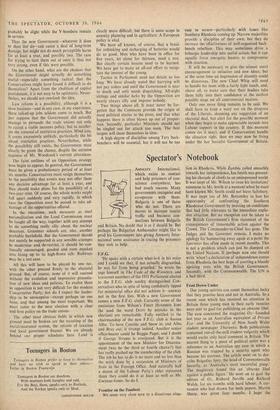F.F.G.
'He spoke with a certain what-is-it in his voice and I could see that, if not actually disgruntled, he was far from being gruntled.' So wrote the sage himself in The Code of the Woosters, and irreverent members of the 1951 Parliament elected to the F.F.G. club sundry distinguished Con- servatives who in spite of being confidently tipped for ministerial office did not achieve it—anyway not in the first lists. With a new Government comes a new F.F.G. club. Certainly some of the omissions from Wilson's FIRST HUNDRED JOBS (he used the word DAYS by mistake in the election) are remarkable. Fully entitled to the chairmanship of the new F.F.G. club is Austen Albu. To have Cousins and Snow in, and Albu and Bray out, is strange indeed. Another senior office-bearer could be Reggie Paget, and I doubt if George Strauss is overjoyed. But it is the appointment of the new Minister for Disarma- ment (was he the third or fourth choice?) that has really pushed up the membership of the club. The job he has to,do is no more and no less than the work done by a succession of Ministers of State in the Foreign Office. And naturally half a dozen of the Labour Party's elder statesmen think they could do it at least as well as Mr. Gwynn-Jones. So do L


































 Previous page
Previous page